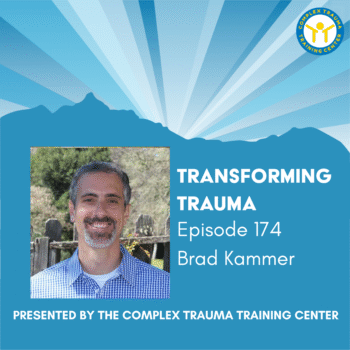Transforming Trauma Episode 174: Celebrating Agency, Therapist Self-Care, and the new NARM Workbook with Brad Kammer, CTTC Training Director
A podcast brought to you by the Complex Trauma Training Center
|
Every so often, a new resource emerges that speaks directly to the needs of an entire field. In this episode, we explore the journey behind “The Workbook for Healing Developmental Trauma”—the anticipated follow-up to the best-selling “Practical Guide for Healing Developmental Trauma”. Co-author Brad Kammer joins us to share how this workbook brings the NeuroAffective Relational Model® (NARM®) from complex theory to accessible day-to-day practice. As Brad explains, readers of the previous NARM books wished for a more approachable, “desk-freindly” guide, so the intention for this workbook was clear: to make the core principles and skills of NARM easier to grasp, use, and live. On this episode of Transforming Trauma, Stefanie Klein sits down with Brad Kammer, LMFT, LPCC, Training Director at the Complex Trauma Training Center, to discuss how the new workbook fills a gap in the field of developmental and complex trauma. For over two decades, Brad has specialized in developmental and complex trauma, working alongside Dr. Laurence Heller, creator of NARM, to evolve and expand NARM’s reach around the world. As the next book in the NARM canon, the workbook follows on from the two previous NARM books to expand the clinical toolkit. Brad and Larry realized that after releasing the previous book, “The Practical Guide”, that while it “went deep into the clinical, we still needed something easier to access.” With a deep passion for mentoring and supporting clinicians, Brad describes creating a hands-on resource for use in their client work as both an honor and a joy. As Brad explains, while all the NARM books were created primarily for mental health professionals, they’re written so that anyone can benefit. “So many people—just humans who deal with these patterns—have really resonated with it,” he shares. A key innovation of the workbook is its dual-purpose design, offering one set of exercises for clinical application and another for personal reflection. For therapists, this approach isn’t only about improving client work—it’s also a pathway to deepen self-understanding and prevent compassion fatigue. “If you don’t have a place to access that and get support around it,” Brad cautions, “that does have consequences.” To further enhance accessibility, the team incorporated visuals and concise chapters to support different learning styles, bridging the space between clinical rigor and lived human experience. As the conversation winds down, Brad shares his hope that this workbook becomes an entry point for a much wider audience—therapists, educators, medical professionals, and anyone seeking to understand or heal their own trauma. He emphasizes the ripple effect, noting, “When they change, those relationships change and we need change in a more connected direction.” Stephanie and Brad’s candor about the vulnerability, passion, and effort behind these NARM resources brings listeners closer to the heart of this transformative work. MENTIONS |
GUEST BIO
BRAD KAMMER, LMFT, LPCC, is the Founder & Director of the Complex Trauma Training Center. Brad is a licensed psychotherapist, educator, consultant, executive producer of the Transforming Trauma Podcast, and co-Author of The Practical Guide for Healing Developmental Trauma. Brad is a Senior Trainer for NARM® Therapist and NARM® Master Trainings, and mentors NARM® Therapists. Brad also developed and teaches the SPACE Program: An Inner Development Program of Support and Self-Discovery for Therapists.
For the last 25 years, Brad has been committed to supporting individuals and communities in the transformation of trauma. Brad began his career as a humanitarian aid worker in Asia working with personal and collective trauma. He later worked in community mental health with youth and families and has worked for over two decades in private practice. He is passionate about helping resolve the widespread impact of Adverse Child Experiences (ACEs) and Complex Trauma (C-PTSD). Brad’s work focuses on the integration of Somatic Psychology, Interpersonal Neurobiology, Relational Models, and wisdom from Traditional Cultures and Spiritual Traditions. Brad lives in a small town in Northern California with his family and loves anything related to music, food, outdoors, and travel.

Subscribe for All Episodes
on your Favorite Service:
We want to connect with you!
Facebook @ComplexTraumaTrainingCenter
Twitter @CTTC_Training
YouTube
Instagram @cttc_training
Learn more about The Complex Trauma Training Center: http://www.complextraumatrainingcenter.com